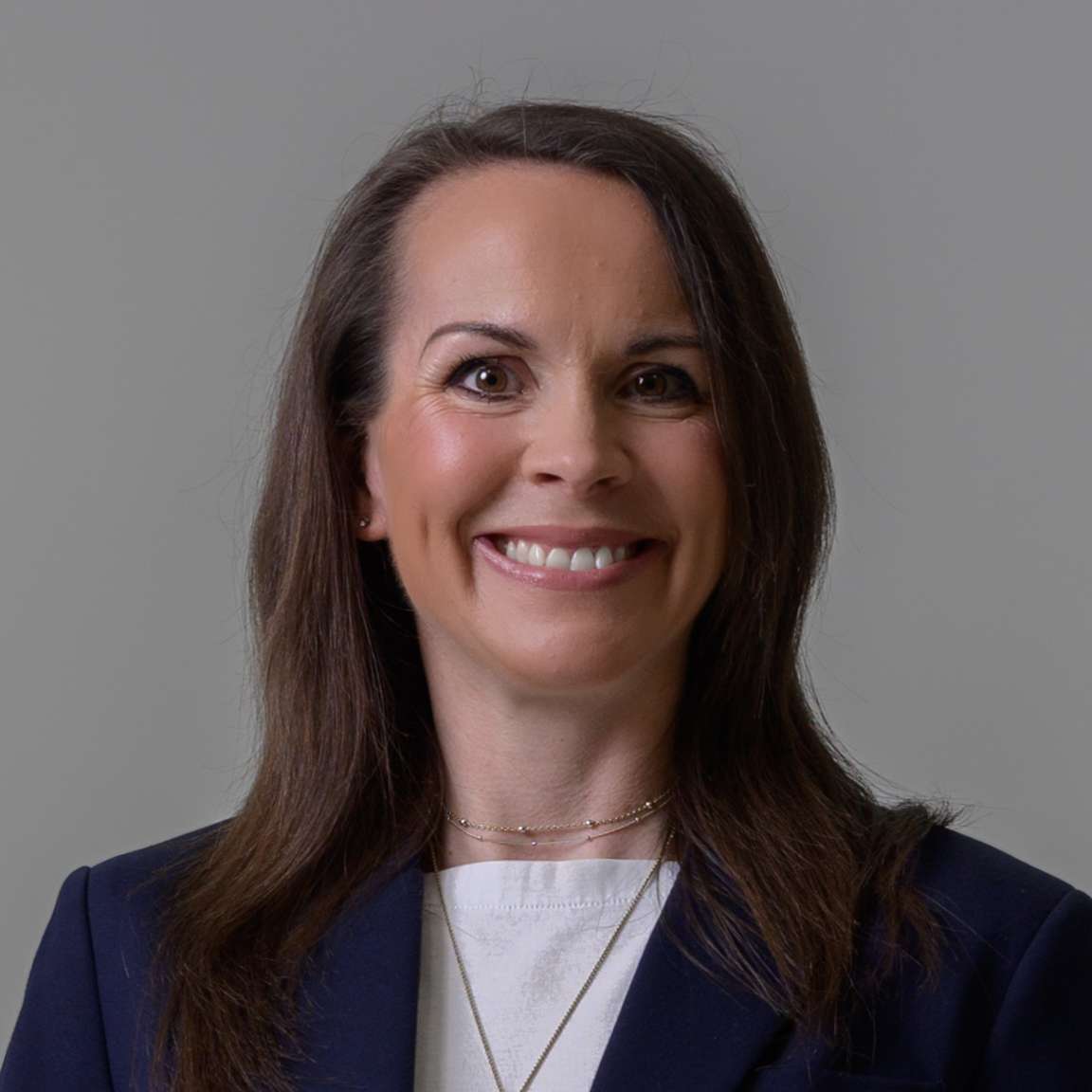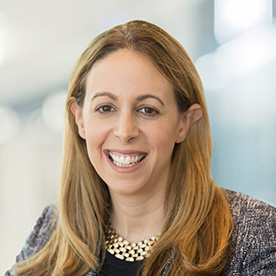Transcript:
Karen Watkin: Welcome to Alpha Females, the new investment podcast from AllianceBernstein. I'm Karen Watkin and I'm a fund manager in the multi-asset solutions team here at AB. As a multi-asset investor, I love the challenge of looking across the capital markets to deliver the best outcomes for our clients, and I work closely with colleagues across all areas of the investment universe to tap into their research and expertise along the way. The Alpha Females are those women who have developed these unique areas of expertise and made their mark in the investment industry. In this series, we'll hear their expert insights on key questions for multi-asset investors, such as where and how to find the best performing fund managers, how AI can be used to generate better investment returns, and how a responsible investment approach can deliver better outcomes for our clients and the planet. We'll also discuss their career journeys, the challenges they faced, and the lessons they've learned along the way. So stay with me as we uncover the stories of these impressive and inspiring women and gain a deeper understanding of the multi-asset investment landscape.
They say that after choosing your doctor, selecting your financial advisor is perhaps the most important decision people can make. As multi-asset investors, we play a vital role in helping manage our clients wealth and financial security. This is a big responsibility and means that trust and integrity are at the heart of what we do. So what are investors looking for in their fund managers? How have their needs for multi-asset portfolios evolved over the years? And what does it take to build the successful businesses and teams focused on meeting those client demands? In this opening episode, we'll explore those questions with someone who has a profound understanding of our clients’ needs. Honor Solomon is CEO for AllianceBernstein in Europe, the Middle East and Africa, where she heads our retail sales and marketing in the region. Honor has had a long and impressive career, building successful sales teams within the investment management sector. She has also long been a champion for diversity and an influential voice both within AB and across the industry. Last year, she was named Investment Week's Distribution Woman of the Year, testament to her ability to build wide reaching, trusted relationships. Fond of quoting Peter Drucker that “culture eats strategy for breakfast”, Honor recognizes that fostering an environment where everyone can thrive and reach their full potential is critical for collective success. Today, we'll hear how she does it. Honor, welcome to the podcast.
Honor Solomon: Thank you for having me.
Karen Watkin: So you wear a number of different hats in your role today as CEO and leader, as saleswoman and diversity champion. How do you describe what you do and what do you see as your key responsibilities?
Honor Solomon: First and foremost, my job is head of retail for EMEA, so for Europe and Middle East. So it's about making sure that our sales team is absolutely running to the best of our capabilities, that we're giving the best service to our clients and that we're speaking to our prospects and absolutely portraying and discussing our funds in the best light possible. So that's with my retail hat on. And with my CEO hat on, it's about bringing our different sales offices across EMEA together in a way that is united, like the United States of EMEA, so that we have communication flowing freely, we have a culture that everyone understands, a common vision, a common strategy - so that everyone is driving in the same direction.
Karen Watkin: As a saleswoman, your role is to take out all of our investment strategies to our clients - our equity funds, our bond portfolios, as well as multi-asset solutions. What would you say are some of the unique opportunities and challenges that come with taking multi-asset solutions to clients?
Honor Solomon: We've got portfolio managers in multi-asset - their day job is to look at all asset classes and look where the most opportunity is. And so it makes the most sense to put it within one portfolio with one person managing all of those different elements. But there are challenges to it because multi-asset is broader in terms of asset classes. It means it can be more complex to describe. And so that in itself just means that the sale does take longer, and also that we need to make sure that we're explaining it in a way that our clients are able to simply explain it to their end clients.
Karen Watkin: And so as you think about building your sales team, what are some of those key ingredients that you look for and what really goes into being a successful sales person, to the extent ultimately you can become your clients trusted advisor?
Honor Solomon: So the question I would say is, when I'm interviewing for a sales person or when I'm assessing a sales person, what am I looking for? What do I think makes a good sales person? I was a salesperson for 15 years before moving into this role. I like to go by one letter, and the letter I go by is the letter C for client and the three elements I look for, for a really strong sales person are contacts, chemistry and culture. A sales person needs to have deep contacts knowing the right people, at the right clients. I've seen salespeople who know a broad array of people, but if they're not the decision makers, then it's not as helpful. But even more important is chemistry. When I'm speaking with a sales person, how is their chemistry within the team? How does the chemistry work with their clients? Because people like to do business with people that they like. And finally, culture is you talked about the Drucker statement “culture eat strategy for breakfast”. I can have the clearest vision, the clearest strategy, but if it isn't embedded with a culture that is real, that people understand, then it's worthless. And so absolutely connecting in with that culture for the salespeople is essential.
Karen Watkin: How do you get to really dive deep with a client to understand what are their needs? What are they trying to achieve? How do you get to that point in your discussions with clients?
Honor Solomon: So first and foremost, it comes back to do we have that chemistry with the organization with the end client. That client needs to be very open book in terms of what they need. And so it's about the advisors, it’s about myself, having that conversation and how I tend to open it is two questions. The first one is what is keeping you awake at night? The second question is what do you want to deliver for your end clients? And I see myself as a bit of a doctor - based on those answers, it's about prescribing the flavor of multi-asset that's going to work, that's that first conversation. The second conversation is about introducing them to the portfolio manager with their first two answers as a basis of the conversation. What I look for the portfolio manager to do and explain a philosophy that will work in tandem with those, what keeps you awake at night? Explain very clearly what is the process of investing so that the fund selector is able to really understand how is alpha generated. And then once that philosophy and process is explained, it's about the proof of the pudding. What is your performance? How historically over - it tends to be a three year, one year and year to date period - how well has the portfolio performed? And then that combination of performance, philosophy, process, with the umbrella of really understanding what the client is after, puts you in the direction of being on the same page of the client.
Karen Watkin: We spoke about the fact that multi-asset, in particular, can potentially become quite complex, just given the breadth of investments that we can potentially cover. How do you balance that need for complexity to deliver the right outcomes for clients with the simplicity that particularly, say, an end client may need in terms of being able to understand what this investment strategy is going to do for them?
Honor Solomon: Me personally, how I do it - this is a little secret. I present to my husband and to my daughter. If they don't understand, the story is not simple enough. It has to be simple because we need to be thinking always about that client that the intermediary is speaking to. How I do it with the team is about identifying the product and then feeding it into the macro environment.
Karen Watkin: And so as you think about having those conversations with clients, and I look back over the length of your career, you've clearly kind of lived through a number of market cycles, in particular more turbulent market environments. How do you handle those more challenging times and difficult conversations with clients, where perhaps markets have been particularly volatile or performance hasn't been as they would have expected?
Honor Solomon: So instinctively, when things go wrong, you sort of want to hide. And so, as a salesperson, but also as a manager now, it's about going absolutely in that opposite direction to how you feel. When things are going wrong, that is absolutely the time to get closer to your clients. It's about explaining that performance and making sure that they are absolutely understand why decisions were made and importantly, what is the path to turnaround. Clients don't tend to redeem based on just performance itself. Clients redeem when they don't see, hear, the path to improvement. And that is my job, that is our job as advisors, to be able to clearly articulate that path.
Karen Watkin: So as you think about what clients are looking for in their fund managers, you mentioned this idea of chemistry. How do you think clients assess their fund managers in terms of that chemistry piece?
Honor Solomon: So I think it stems from understanding. It's really important to get the audience right so you're pitching it at the right level. It's about trust. It's about they are giving, apart from their family, their precious commodity, their money to an individual, to a team, to an organization. They have to trust that we will treat that money as if it was our own and that comes from looking at the whites of the eyes. It comes from there being a connection, a trust developed.
Karen Watkin: So how do you define culture in an organization like AB, and how do you seek to build that in the teams that you manage?
Honor Solomon: Joining AB, I went through 17 interviews. It was it was one of the most intense processes of my life. And after each one, they were like, oh no, you're nearly there. And then there was another interview. And what became clear was that AB was super protective of that culture. And every culture and every organization is slightly different. How I define it here at AB is about it's a flat hierarchy. Lack of politics, real transparency. How I define culture as a whole. It's the heartbeat of an organization. It's absolutely the values, the set of how we move forward the business based on our integrity, and then how I define it and how I bring it to life within my team is through two rules that are sort of been non-negotiable in any team that I've run. The first rule is that family comes first. I love my job, but my most important job is I'm a mom and I'm a wife, and I'm a daughter and I'm a sister. That is what I feel is absolutely something that has to be recognized by myself, by my leaders, by my team. And that it doesn't have to compromise my role. And the second rule is that nothing goes left unsaid. And this is about transparency in conversation. I mentioned before a culture at AB where there's not politics, where there's not hierarchies, but that can only really exist first if we're able to be direct with each other. There are times when you and I are not going to agree. Similar with other areas of the organization. But what I find doesn't work is if people do not feel empowered to share their disagreements, we need to create a space where that is absolutely encouraged and people feel empowered, and that transparency is that key to that.
Karen Watkin: So I love your first rule, that family comes first. And I think it's so important that that gets articulated and acknowledged. But given your client focus role is that not perhaps a bit counterintuitive? How do you balance those family commitments with your professional demands and your career ambitions?
Honor Solomon: I think it's about getting your team right. So within the team, it's about being clear on who backs who up so that if I have a family commitment, the person who is on call is really aware of that they're on call. But most importantly, it's about being super organized. So going through my diary and being clear, I can't go to every school thing. I mean, I would be there every week. So what I say to my children is pick the really important ones. It tends to be once a term, one sporting event or one play that is really important to them. And as long as we've got that communication going with my family, then the rest comes because then I'm able to absolutely identify where are the client priorities, where it is a non-negotiable point that I have to be there. The conflict comes is when that school play is on the same day as that pitch, and that is really, really hard. And those are my most difficult moments where I feel like I'm being a rubbish mum and a rubbish person at work. But thankfully it's really rare and I'm very lucky I have a great partner in my husband and I'm very lucky to have a great family around me, and that's where the compromise comes in.
Karen Watkin: It speaks really to the values that you talked about. And actually, if you're making your decisions based on those values, that can give you a very clear framework, I think, for assessing know where are the priorities both professionally and then personally and like you say, you know, we can't be in all places at once. But if you have a clear sense of where the priorities lie, you can make sure you're meeting the demands, you know, both professionally and personally, without having to compromise too often. And I think you're a great role model in that respect.
Honor Solomon: I think, I felt a bit emotional when you when you were saying that. I think the reason why I put it at the forefront, family comes first, is because when I started my career 20 years ago, there was no way that I could. It was absolutely frowned upon. And I look back at my diaries where my first pregnancy, I hid it for the first eight months because I was, you know, I was walking around massive bump and everyone knew that I was pregnant, but I didn't I didn't know how to say it. I didn't know how to say having children was important to me, and I didn't want anyone else to ever have to go through that. And I think that was because at that time, 20 years ago, women didn't know how to say it. Perhaps men didn't know also how to put it. Now, I've built up my confidence over the last 20 years and also the environment around has changed. It's much more diversity supportive than I'm able to in a really safe space, and that if I'm able to talk about it, it means people will feel able to talk about it and then you're able to pay it forward. And then that will help my daughter.
Karen Watkin: And as you think about the course of your career, what would you say are some of the three key lessons that you've learned along the way to build a successful career in asset management?
Honor Solomon: The roadmap that has been most helpful to me has been one. Being able to be myself. When I started, I thought I needed to be more technical or more thoughtful or clever. I don’t know what it might be, and what has been helpful are people guiding me to just be a more polished version of myself. So I've used sponsors and mentors to really guide me at the different chapters of my career, connecting in, partnering with people who've been able to guide me, to just help me do what I'm going to do. Not in a different way, just in a slightly better Honor way. And the third piece is paying it forward. I've been really lucky to have these guides, and also to be a point in my career where I feel more confident and people sometimes want to listen to me, and I get this wonderful platform to be able to do podcasts like this or speak at more events. And I've got two choices there - you can either talk about how incredible the organization is, which I try and do because I really believe it is, but also do something which is going to benefit individuals so that we can make asset management an even better place for diversity. But for people to really enjoy working and feel that they can be themselves. And so I think that's probably the third pillar, that paying it forward makes me feel bloody fantastic. But it also means that I'm making a mark on the industry, which is, yeah, essentially what I want to be able to do.
Karen Watkin: Fantastic advice. Thank you so much for joining me on the podcast today.
Honor Solomon: It's been a pleasure. Thank you.
Karen Watkin: I think on a just clearly shows such a huge amount of passion for what she does, both in terms of her focus on our clients and building those deep client relationships, but also leading our business and being a truly kind of authentic and empathetic leader. The two non-negotiable rules she brings to her teams that she mentioned are really compelling and really insightful in terms of this idea of family first and not feeling you have to compromise on that and having those personal values really at the core of everything that you do. And this idea of nothing left unsaid. So having very open, direct, honest relationships, both with our clients, but also on a personal level with colleagues as well as family, and I think that really demonstrates what she brings to AB in terms of her leadership and the culture that she's fostering, you know, across our firm as a whole. I also loved one of her key kind of lessons learned, or insights, around paying it forward, and she absolutely demonstrates this with her leadership of bringing up the people behind her and creating a culture where everybody can thrive and leading not only by example, but really taking direct and practical steps to strengthen the culture at AB and across the asset management industry in terms of the mentoring, sponsoring, that she does and helping women and others kind of build strong networks and relationships to ultimately help create a more diverse and inclusive industry.
That brings to a close this first episode of Alpha Females, The Investment podcast, from AllianceBernstein with me, Karen Watkin. If you've enjoyed this episode, don't forget to tell your colleagues and friends about it and please join me for future programs. It's only remains for me to thank Honor Solomon. This episode was produced by Richard Miron from Earshot Strategies.





